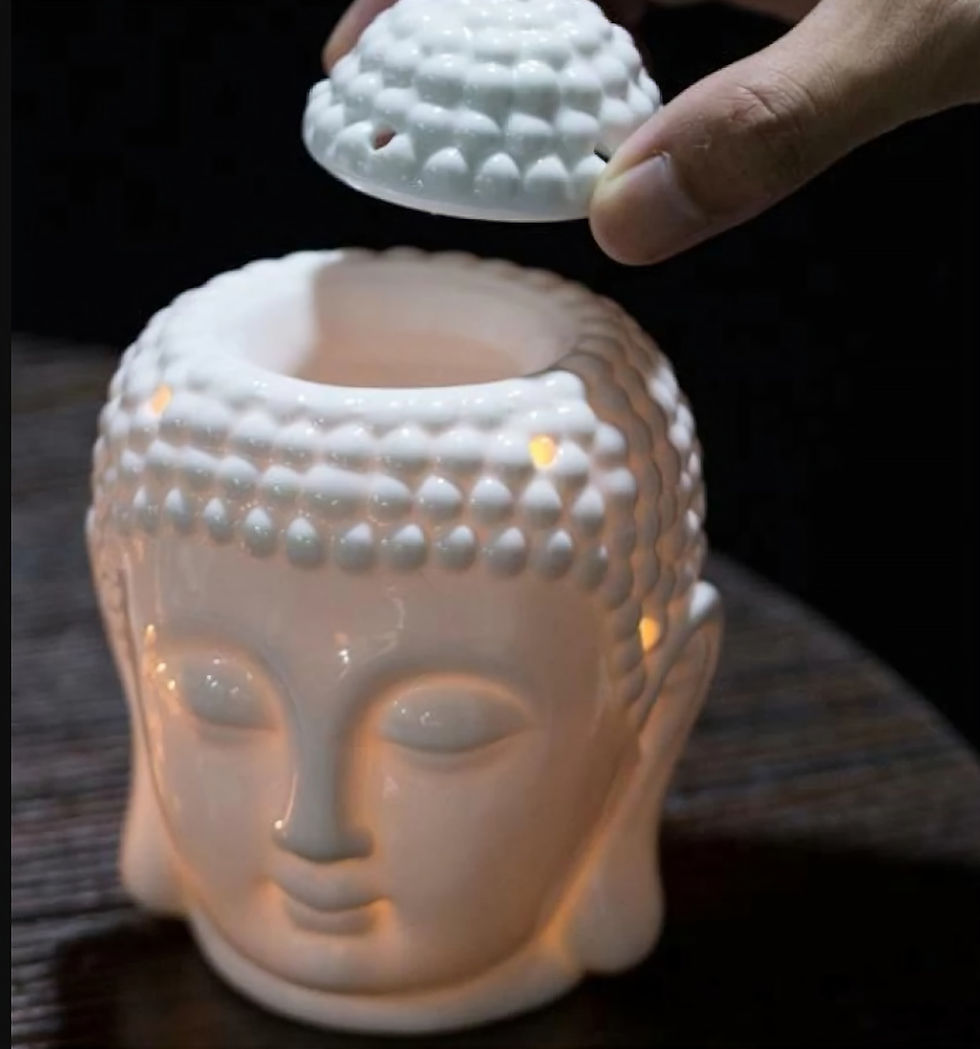The Ultimate Guide to Choosing the Perfect Diffuser for your Essential Oils
- Conscious Living
- Apr 3, 2024
- 3 min read
Understanding Different Types of Diffusers:
Ultrasonic Diffusers: These diffusers use ultrasonic vibrations to break down essential oils into micro-particles, which are then dispersed into the air as a fine water and essential oil mist. They often double up as humidifiers and are suitable for larger spaces. They are usually made with fibre and are quite sturdy. The reservoir is filled with water to which essential oil drops are added. We often use them during summers as it not only diffuses the aromas but also cools down the room. [It is important to note that Nebulising diffuser and ultrasonic diffusers are not the same. It is also harder to find Nebulising diffusers in the dian market which are made especially for diffusing essential oils. Nebulizing diffusers don’t use water. Instead, you fill them with essential oil which is dispersed as fine mist.]

Electric Warmer Diffusers: These diffusers use heat to disperse Essential oils into the air. They are usually made with shiny ceramic material which is fragile. The dispersion of the aroma is gentler when compared with ultrasonic diffusers. If used for a very long duration they do tend to get quite hot.The reservoir is filled with water to which essential oil drops are added. We prefer to use these during winter season as they impart a sense of warmth and soft light too.

Non-Electric Ceramic Diffusers: These also use heat to disperse essential oils but instead of using electricity they require a tea light candle to generate the heat. The reservoir is filled with water to which essential oil drops are added. They are portable and suitable for smaller spaces or as tabletop diffusers. For beginners, we strongly recommend this low-cost option to get started with and progress to an electric diffuser.

Reed Diffusers: These consist of a ceramic container filled with carrier oil mixed with Essential oils in which reed sticks are placed. The oil travels up the reeds and releases the aroma gently into the air over a period of time. A 100 ml reed diffuser with 6-7 reed sticks can disperse the aroma for about a month. They offer a very subtle continuous scent dispersion when compared with other diffusers. In the market, you would often find synthetic fragrance-based reed diffuser oil so make sure to check the ingredients before you buy or simply DIY at home.

Consider Your Needs:
Room Size: Larger rooms (like bedrooms or living rooms) may require more powerful diffusers like ultrasonic or electric warmers while smaller spaces (Reading areas, study rooms) can be adequately served by non-electric ceramic diffusers or reed diffusers.
Purpose: Are you looking for a diffuser primarily for relaxation, therapeutic benefits, or to freshen the air? Do you intend to use it regularly or only on specific days? Consider your intended use when choosing a diffuser type. For continuous long-term usage, we recommend you get an electric diffuser of your choice.
Maintenance: Electric diffusers are quite easy to maintain and run. All they need is water and essential oils. On the other hand, a non-electric ceramic diffuser would require you to always have a stock of tea-light candles handy. Reed diffusers need to be re-freshened with more essential oils if the aroma starts to fade.
Budget: Diffusers come in a wide range of prices. Determine your budget and prioritize features that are most important to you within that range. From least expensive to most expensive - 1.Reed diffusers 2. Ceramic diffusers 3. Ultrasonic diffusers 4. Electric ceramic warmer diffuser.
Personal Preferences:
Scent Intensity: If you prefer a strong scent, Ultrasonic diffusers/ Electric warmer diffusers offer an intense aroma, while those who prefer a subtler aroma may opt for the non electric ceramic diffuser or reed diffuser.non-electric
Visual Appeal: Consider the design and aesthetics of the diffuser, as it will be a prominent feature in your space. Choose one that complements your décor and personal style.
Noise Level: Some diffusers may produce feeble noise during operation, especially ultrasonic ones with built-in fans. If you're extremely sensitive to noise, this might be a consideration. However, we have had no issues using them :)
Before you go, check out a few must-have Essential oils for beginners






Comments